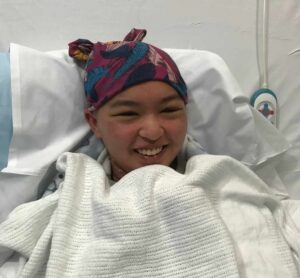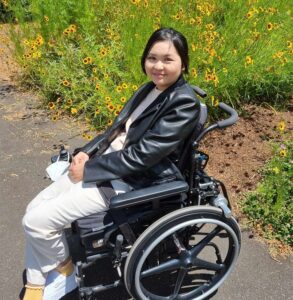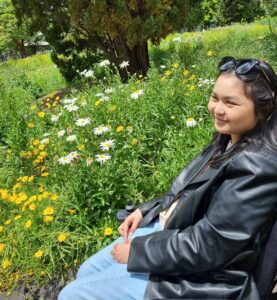18-year-old pharmacy student Christie Yu had the world at her feet. Then blood cancer changed everything
After numerous setbacks, Christie had to slowly transition back to her studies not once but twice. This forced her to make a tough decision that would shape the rest of her career.
In 2019, Christie Yu began studying pharmacy at the University of Sydney, and she was immensely excited for life’s next chapter. “I transitioned well into university, both socially and academically,” Christie says.
“That was until I became very sick. I was vomiting for several days and became sensitive to light. I couldn’t get a blood test from the GP because I was so dehydrated, so Mum took me to the emergency room.”

Christie had to immediately suspend her studies to begin treatment before requiring a stem cell transplant.
Two years after her initial diagnosis in 2021, Christie made her first gradual return to her studies amid the COVID-19 pandemic.
While it was challenging returning to university after both a stem cell transplant and developing graft versus host disease (GvHD), lockdown restrictions forcing classes online actually helped Christie with her transition as she didn’t have to attend university in person.
“I returned to university in the second semester of 2021. Since universities had to adapt to lockdown and moved most courses online, I decided to try part-time continuing my pharmacy degree to help pass the time.”
Christie was also granted additional time by her university to submit assessments, which aided her transition.
Shortly after, however, Christie began to experience further complications.
Christie was forced to take a further year off university to focus on her health and adapt to a mobility disability after complications following graft versus host disease treatment led to using a wheelchair. This eventually put her future career in doubt – and she was faced with a tough decision.
“I talked to the pharmacy dean and he explained the university was about to change the degree – where if I failed or missed a course due to health reasons, they may not be able to provide that class [again] if there weren’t enough students.”
“This would mean I’d have to start the degree from scratch. He was also mindful of my immunosuppression, where seeing patients [as part of my studies] could be risky for me.”
Returning to her studies in pharmacy was always the goal for Christie during treatment, but factors outside of her control forced her to evaluate whether this was still possible.
“I wasn’t sure if being a pharmacist was achievable or desirable for me anymore. After accepting my reality, particularly with my pain levels, I decided to change courses.”
Christie remained at the University of Sydney but transferred to psychology, because it was science-based and had less lab requirements.
“It was a really hard choice to make,” she says. After returning to her studies for the second time in 2023, Christie continued to receive additional support from the University as she adjusted to using a wheelchair and balanced other health issues.
“Disability services helped facilitate timetabling wheelchair accessible class and exam rooms, alongside assessment deadline adjustments to ensure I could return safely and comfortable back to study.”
But while she’s content with her decision and the support she’s receiving, she can’t help but think about the standard ‘university experience’ that she feels she will now never have.
“Being unable to go through the degree with the same cohort has been a little lonely. It does make me feel I missed the ideal uni experience I envisioned, but I’ve come to terms with that.”
We asked Christie what strategies and practices she put in place to help her transition back to study.
“I changed my studies to part-time, and then reassessed the study load before the census date. I was also able to request an ‘academic plan’ from the uni’s disability services department every semester, and they arranged assessment deadline adjustments and wheelchair accessible rooms for each class.”
She also gradually increased her contact hours, starting with 2-3 hour visits and slowly building up from there which helped manage her pain and energy levels.
Christie is currently in the second year of her psychology degree, with her health issues not as prevalent.
“Currently my health issues are less salient, although I infrequently experience a flareup of some kind. I still think I can’t do full time due to ongoing fatigue and pain issues. But I’m enjoying psychology a lot. For the future, I hope to be in a career that I find fulfilling and meaningful.”
For others aiming to return to study while living with blood cancer, Christie has this advice.
“It’s definitely possible, even with ongoing issues like disability or fatigue. Survivorship in general may not be what you imagined or expected, and it’s normal to grieve that. For study, it could be about not being able to study full time, or graduate with your friends, or having to change your degree.”
“Realistically, returning to study is probably not going to be linear, despite how unfair that is. But as I found, there’s lots of support available.”
If you have any questions about returning to study while living with blood cancer, the Leukaemia Foundation is here to help. You can give us a call on 1800 620 420, or submit an enquiry form via our website.

